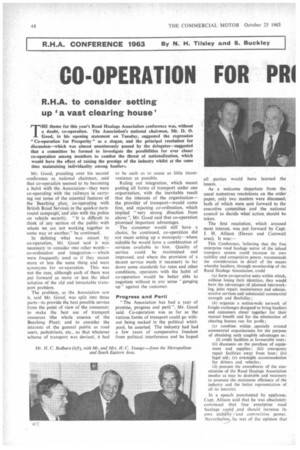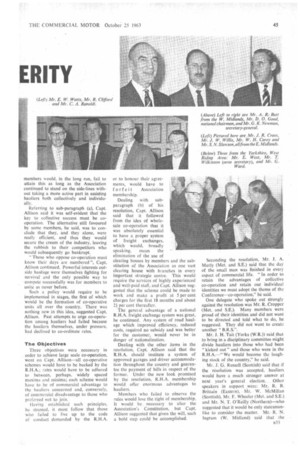GO-OPERATION FOR PRI ERITY
Page 46

Page 47

If you've noticed an error in this article please click here to report it so we can fix it.
R.H.A. to consider setting up 'a vast clearing house'
THE theme for this year's Road Haulage Association conference was, without a doubt, co-operation. The Association's national chairman, Mr. D. 0. Good, in his opening statement on Tuesday, suggested the expression "Co-operation for Prosperity" as a slogan, and the principal resolution for discussion—which was almost unanimously passed by the delegates—suggested that a committee be formed to investigate the possibilities for ever closer co-operation among members to combat the threat of nationalization, which would have the effect of raising the prestige of the induslry whilst at the same time maintaining individuality among hauliers.
Mr. Good, presiding over his second conference as national chairman, said that co-operation seemed to be becoming a habit with-the Association—they were co-operating with the railways id carrying out some of the essential features of the • Beeching plan; co-operating with British Road Services in the quicker-turnround campaign, and also with the police
on vehicle security. It is difficult to think of any section of the public with whom we are not working together in sonic way or another," he continued.
In defining what was 'meant by co-operation, Mr. Good said it was necessary .to consider two other Words— co-ordination and integration — which were frequently used as if they meant more or less the same thing and were synonyms for co-operation. This was not the case, although each of them was put forward as more or less the ideal solution of the old and intractable transport problem.
The problem, as the Association saw it, said Mr. Good, was split into three parts—to provide the best possible service from the point of view of the consumer; to make the best use of transport resources (the whole essence of the Beeching Plan); and to consider the interests of the general public as road users, pedestrians, etc., so that whatever scheme of transport was devised, it had to be such as to cause as little inconvenience as possible.
Ruling out integration, which meant putting all forms of transport under one organization, with the inevitable result that the interests of the organization— the prOvider of transport—would come first, and rejecting co-ordination, which implied _" very strong direction from abmie", Mr. Good said that co-operation promised important advantages.
The consumer would still have a choke; he continued, co-operation did not mean setting up a monopoly—where suitable he would have a combination of services available to him. Quality of service could be maintained and improved, and where the provision of a decent service made it necessary to lay down some standards for rates and other conditions, operators with the habit of co-operation would be better able to negotiate without in any sense " ganging up" against the customer.
Progress and Peril The Association has had a year of promise, progress and peril", Mr. Good said. Co-operation was as far as the various forms of transport could go without being sucked in the political whirlpool, he asserted. The industry had had a few years of comparative freedom from political interference and he hoped
all parties would have learned the lesson.
As a welcome departure from the usual numerous resolutions on the order paper, only two matters were discussed, both of which were sent forward to the executive committee and the national council to decide what action. should be taken.
The first resolution, which aroused most interest, was put forward by Capt. J. H. Allison (Devon and Cornwall area). It was:— This Conference, believing that the free enterprise road haulage sector of the inland transport system could increase its own stability and competitive power, recommends the consideration in detail of the means whereby hauliers, through membership of the Road Haulage Association, could
(a) form co-operative units within which, without losing their identities they would have the advantages of planned interwork • ing, joint repair, maintenance and administrative services and substantial commercial strength and flexibility ;
(12) organize a nation-wide network of freight exchanges designed to bring hauliers and customers closer together for their mutual benefit and for the elimination of clearing houses run for profit ; (c) combine within .specially created commercial organizations for the purpose of obtaining such tangible advantages as: (i) credit facilities at favourable rates; (ii) discounts on the purchase of equipment and supplies: (iii) emergency repair facilitiesaway from base ; (iv) legal aid; (v) overnight accommodation for drivers and vehicles ; Id) procure the amendment of the constitution of the Road Haulage Association insofar as may be desirable and necessary to promote the maximum efficiency of the industry and the better representation of all its interests.
In a speech punctuated by applause, Capt. Allison said that he was absolutely convinced that free enterprise road haulage could and should increase its own stabirity < and comnetitive power. Nevertheless, he was of the opinion that
members would, in the long run, fail to attain this as long as the Association continued to stand on the side-lines without taking a more active part in assisting hauliers both collectively and individually.
Referring to sub-paragraph (a), Capt. Allison said it was self-evident that the key to collective success must be cooperation. The alternative still favoured by some members, he said, was to conclude that they, and they alone, were really efficient, and thus they would secure the cream of the industry, leaving the rubbish to their competitors who would subsequently go bankrupt.
Those who oppose co-operation must know their days are numbered ", Capt. Allison continued. Powerful interests outside haulage were themselves fighting for survival and the only possible way to compete successfully was for members to unite as never before.
Such a policy would require to be implemented in stages, the first of which would be the formation of co-operative units all over the country. There was nothing new in this idea, suggested Capt. Allison. Past attempts to urge co-operation among hauliers had failed because the hauliers themselves, under pressure, had declined to co-ordinate rates.
The Objectives Three objectives were necessary in order to achieve large scale co-operation, went on Capt. Allison—all co-operative schemes would have to be backed by the R.H.A.: rates would have to be adhered to between, perhaps. widely spaced maxima and minima; each scheme would have to be of commercial advantage to the hauliers concerned and, conversely, of commercial disadvantage to those who preferred not to join.
Having established such principles. he stressed, it must follow that those who failed to live up to the code of conduct demanded by the R.H.A. or to honour their agreements, would have to forfeit Association membership.
Dealing with subparagraph (b) of his resolution, Capt. Allison said that it followed from the idea of wholesale co-operation that it was absolutely essential to have a proper system of freight exchanges, which would, broadly speaking, mean the elimination of the use of clearing houses by members and the substitution of the Association as one vast clearing house with branches in every important strategic centre. This would require the services of highly experienced and well-paid staff, and Capt. Allison suggested that the scheme could be made to work and make a profit at 5 per cent charges for the first 18 months and about 21 per cent thereafter.
The genial advantage of a national R.H.A. freight exchange system was great, he continued. Any system of road haulage which improved efficiency, reduced costs, required no subsidy and was better for the customer, would never be in danger of nationalization.
Dealing with the other items in the resolution, Capt. Allison said that the R.H.A. should institute a system of approved garages and driver accommodation throughout the country and guarantee the payment of bills in respect of the former. Under the new look promised by the resolution, R.H.A. membership would offer enormous advantages to hauliers.
Members who failed to observe the rules would lose the right of membership. It would be. necessary to 'alter the Association's Constitution, but Capt. Allison suggested that given the will, such a bold step could be accomplished. Seconding the resolution, Mr. J. A. Murly (Met. and S.F.) said that the day of the small man was finished in every aspect of commercial life. "In order to retain the advantages of collective co-operation and retain our individual identities we must adopt the theme of the Conference—co-operation," he said.
One delegate who spoke out strongly against the resolution was Mr. R. Cropper (Met. and S.E.). Many members were proud of their identities and did not want to be directed and told what to do, he suggested. They did not want to create another " B.R.S.".
Mr. J. H. Tait (Yorks (W.R.)) said that to bring in a disciplinary committee might divide hauliers into those who had been "kicked out" and those who were in the R.M.A.—" We would become the laughing stock of the country," he said.
Mr. J. G. Russell (Scottish) said that if the resolution was accepted, hauliers would have a much stronger answer at next year's general election. Other speakers in support ,were: Mr. R. B. Brittain (Eastern), Mr. W. McMillan (Scottish). Mr. F. Wheeler (Met. and SE.). and Mr. N. T. O'Reilly (Northern)—who suggested that it would be only statesmanlike to consider the matter. Mr. • R. N. Ingram (W. Midland) said that the




























































































